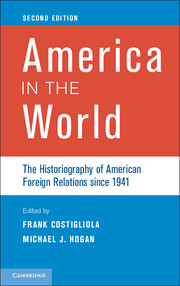Book contents
- Frontmatter
- Dedication
- Contents
- List of Contributors
- Preface
- 1 Introduction
- 2 The Charlie Maier Scare and the Historiography of American Foreign Relations, 1959–1980
- 3 Chaps Having Flaps: The Historiography of U.S. Foreign Relations, 1980–1995
- 4 Still Contested and Colonized Ground: Post–Cold War Interpretations of U.S. Foreign Relations during World War II
- 5 Recent Literature on Truman’s Atomic Bomb Decision
- 6 The Cold War
- 7 Cold War Presidents: Dwight D. Eisenhower, John F. Kennedy, Lyndon Baines Johnson, and Richard M. Nixon
- 8 The War that Never Ends: Historians and the Vietnam War
- 9 Culture and the Cold War: U.S.–Latin American Historiography since 1995
- 10 Impatient Crusaders: The Making of America’s Informal Empire in the Middle East
- 11 Explaining the Rise to Global Power
- 12 Bringing the Non-State Back In
- 13 Technology and the Environment in the Global Economy
- 14 U.S. Mass Consumerism in Transnational Perspective
- 15 A Worldly Tale
- Index
- References
13 - Technology and the Environment in the Global Economy
Published online by Cambridge University Press: 05 June 2014
- Frontmatter
- Dedication
- Contents
- List of Contributors
- Preface
- 1 Introduction
- 2 The Charlie Maier Scare and the Historiography of American Foreign Relations, 1959–1980
- 3 Chaps Having Flaps: The Historiography of U.S. Foreign Relations, 1980–1995
- 4 Still Contested and Colonized Ground: Post–Cold War Interpretations of U.S. Foreign Relations during World War II
- 5 Recent Literature on Truman’s Atomic Bomb Decision
- 6 The Cold War
- 7 Cold War Presidents: Dwight D. Eisenhower, John F. Kennedy, Lyndon Baines Johnson, and Richard M. Nixon
- 8 The War that Never Ends: Historians and the Vietnam War
- 9 Culture and the Cold War: U.S.–Latin American Historiography since 1995
- 10 Impatient Crusaders: The Making of America’s Informal Empire in the Middle East
- 11 Explaining the Rise to Global Power
- 12 Bringing the Non-State Back In
- 13 Technology and the Environment in the Global Economy
- 14 U.S. Mass Consumerism in Transnational Perspective
- 15 A Worldly Tale
- Index
- References
Summary
This essay will address the developments in the literature on U.S. foreign relations from the perspectives of technology and the environment in the period since 1941. Only in the past fifteen years or so have diplomatic historians generally recognized these to be fruitful topics worth exploring at their intersections with foreign relations. Because of the comparative newness of such perspectives within the field, the rich debates or competing schools of thought that mark the literature on other topics have not yet developed. Therefore, a thematic approach to this area offers perhaps the best method to explore the principal ways that foreign relations historians have been thinking about technology and the environment in the global economy since mid-century. We can categorize this scholarship as dealing with weapons, energy, communications, transportation, export control, modernization theory, scientific expertise, and the environment. Because of space limitations, much of what follows in this essay is by necessity from a U.S. perspective. Nevertheless, the interconnectedness of the world means that multinational, multilingual, and multiarchival explorations of these topics are both ongoing and important in their own right.
- Type
- Chapter
- Information
- America in the WorldThe Historiography of American Foreign Relations since 1941, pp. 284 - 306Publisher: Cambridge University PressPrint publication year: 2013
References
- 1
- Cited by

